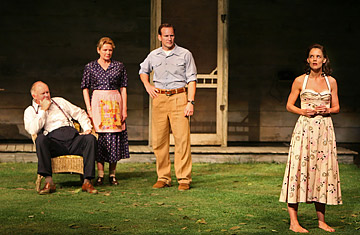
John Lithgow, Dianne Wiest, Patrick Wilson and Katie Holmes in a scene from All My Sons, a revival of Arthur Miller's play currently running at Broadway's Gerald Schoenfeld Theatre in New York
Theater critics love to complain about the glut of revivals on Broadway, but what would we do without them? For one thing, they keep the theaters filled — something that a handful of new musicals (and an even smaller handful of straight plays) each season could never do on their own. For another, they let critics show off their taste and theatrical erudition: doling out ritual praise to the classics of the canon, comparing and contrasting the new production with the Definitive 1975 Version That I Saw But You Didn't. And they give stars a chance to demonstrate their acting chops, stretch their talents — and, of course, keep working.
A good example of the pleasures of the star revival is the new production of A Man for All Seasons, with Frank Langella doing the honors as Sir Thomas More, the chancellor to King Henry VIII who went to death rather than betray his conscience by blessing the king's divorce and his break with the Church of Rome. Langella's interpretation has drawn some criticism, suprisingly, for being too saintly and hammy — surprising because what stood out for me in Langella's performance was how bracingly human it is. As the rebellious counselor, Langella is a man of stoic determination, but not without moments of fear, doubt, temper and smugness; his moral courage seems cobbled out of human reason and resolve rather than handed down from God. And if Robert Bolt's 1960 play looks a bit square today, with its period setting and easy-to-follow moral outline, it's beautifully written, clearly argued and, with a lot of help from Langella's magnetic performance, undeniably stirring.
I was less stirred by the revival that has received the most resounding critical huzzahs of the fall, the London Royal Court theatre's production of Chekhov's The Seagull. Kristin Scott Thomas is the biggest star name in this one, and as Arkadina, the aging actress around whom revolves a typically Chekhovian slice of unhappy provincial life, she's just fine, if somewhat less the diva than I imagine Arkadina on the page. Indeed, the whole cast deserves high grades (though Peter Sarsgaard, an American ringer among the Brits, brings down the curve a bit). What bothered me was the fussy and ponderous direction by Ian Rickson. From the famous first line, "Why do you always wear black?" — which is broken in two when the character to whom it is spoken, Masha, silences the speaker mid-sentence with an impatient wave of her hand — I knew we were in trouble. Everywhere, Rickson throws in unnecessary filigree — extra pauses, characters wandering onto the stage unbidden — to emphasize the languorous, depressive mood; if I didn't know better, I might have thought it was a Chekhov parody. The Seagull remains one of the Russian master's richest and most affecting plays, but the preciousness of this production soured it for me.
It's probably unfair to compare the subtleties of Chekhov with the high-strung dramatics of Arthur Miller, but at least Simon McBurney, director of the gripping new revival of All My Sons, seems energized by the play rather than enervated by it. McBurney, artistic director of the avant-garde Complicite theater company, has reimagined Miller's domestic drama as a stylized mixture of Brecht and Euripedes. The main characters open the play by announcing they're going to perform a play for us; supertitles introduce us to "Act I," "Act 2" and even the "Intermission." The set is spare and semi-abstract: a screen door, segments of wire fence, a window floating in the night sky. Secondary characters linger offstage in full view of the audience, or gather to listen at key moments, forming an accusatory Greek chorus. Video projections and ominous, movielike underscoring help solidify the enveloping tension and sense of doom.
This 1947 drama, Miller's first stage success, centers on Joe Keller, a manufacturer who knowingly shipped defective airplane parts during World War II. (It's quintessential Miller, which means quintessential Ibsen: there's no real action, just reaction to the revelation of long-hidden secrets.) Miller's indictment of business ethics and portrait of a family in crisis can seem overwrought, but McBurney's solution is to go the playwright one better; his expressionistic devices imbue the play with tragic universality. The capable cast includes John Lithgow as Joe, Dianne Wiest as his wife, and Patrick Wilson as his adoring, deluded son. But the reason crowds are rushing to see All My Sons is the fourth member of the ensemble: Katie Holmes, making her Broadway debut as the daughter of Joe's disgraced business partner. Mrs. Cruise holds her own quite well. She's got stage presence, a voice that fills the theater, and if her line readings can seem a little strident, they are perfectly in tune with the haunting modernist symphony that McBurney has created. It's a revival to remember.
